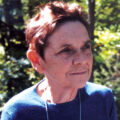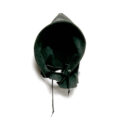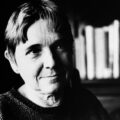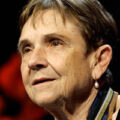Notes Toward a Politics of Location
1.
“I am to speak these words in Europe, but I have been searching for them in the United States of America.” This is how Adrienne Rich begins her lecture, “Notes toward a Politics of Location,” given at the Conference on Women, Feminist Identity, and Society in the 1980s held in Utrecht, the Netherlands, on June 1, 1984.
I write these words in Utrecht, 2015, but I have been searching for them in the United States of America as well.
2.
Rich doesn’t mention it in this particular lecture, but she had spent time in the Netherlands before. Between 1961–1962, Rich lived in Rotterdam with her husband, Alfred Conrad, and her three very young sons, while Conrad, having a sabbatical from Harvard University, did research at the Netherlands School of Economics with Jan Tinbergen. Rich, having received a Guggenheim and then a Bollingen grant, wrote the poems that would form Snapshots of a Daughter-in-law, which many call her first overtly feminist collection, while she also translated Dutch poetry.
Rich specifies in her Guggenheim application—a copy of which remains in the Schlesinger archives at Harvard—that she requests funding primarily to pay for childcare while living abroad; the new routine, the adjustment to an unfamiliar and foreign place, the lack of community and support, would make a young mother’s conditions for writing nearly impossible.
3.
Last year, my family and I moved permanently to Utrecht—or at least as long as one can foresee permanence. Like Rich, I had spent time in the Netherlands before. Between 2009–2011, for a year-and-half, I lived in Utrecht with my husband, while he had a sabbatical from Harvard. I had a fellowship to work on my dissertation. During that time I became pregnant and gave birth to my first child.
4.
“Begin, we said, with the material, with matter, mma, madre, mutter, moeder, modder, etc., etc.,” Rich writes. “Begin with the material. Pick up again the long struggle against lofty and privileged abstraction.” So this is how I begin.
5.
To me, my first child was born in a foreign country, within a foreign healthcare system, with the assistance of foreign midwives, doctors and nurses. This foreign country is often lauded for its unmedicalized approach to labors. And much of this is well deserved. Sometimes, however, labors must be medicalized, as mine/my child’s was. This is an instance where being foreign can make an irrevocable, absolute impression. Here is Rich again:
When I write “the body”, I see nothing in particular. To write “my body” plunges me into lived experience, particularity: I see scars, disfigurements, discolorations, damages, losses, as well as what pleases me. Bones well nourished from the placenta; the teeth of a middle-class person seen by the dentist twice a year from childhood. White skin, marked and scarred by three pregnancies, an elected sterilization, progressive arthritis, four joint operations, calcium deposits, no rapes, no abortions, long hours at the typewriter—my own, not in a typing pool—and so forth. To say “the body” lifts me away from what has given me a primary perspective. To say “my body” reduces the temptation to grandiose assertions.
My body, like Rich’s, is inscribed with the privileges of being a middle-class person with access to regular healthcare and whose greatest scars come from her pregnancies and from long hours typing. My skin, however, is not white. But I can, and have, spent most of my life pretending it is. Or rather, pretending it is nothing. When I write “the body,” I see nothing in particular. This is how I have lived most of my life, seeing “the body” instead of “my body.”
I cannot generalize, but my particular immigrant experience, of having moved from South Korea to the United States as a child; of having a mother who always felt foreign and never secure, never safe, in her surroundings; of having parents who insisted on their difference and marked out their home (in Tampa, in Irvine, in Cupertino, in San Jose, in Saratoga) as a small enclave where they would not be foreign; meant that my body was shielded as much as possible from both the outer world and my own thinking. Button up that shirt. Don’t wear shorts at the mall. Who knows what men are thinking? How can you go out in public with only flip-flops on your feet? Be just as smart as the Michaels and Davids and Kevins in your class; no, you have to be smarter. Don’t act out like the white kids, but don’t let them see your Asianness, your femaleness, your foreignness, in anything you achieve. You can beat them at their own game.
Being pregnant; being in the hands of a foreign healthcare system (in a place where many speak English but not with the nuances, the comprehension, that I assume or that they assume; in a place that has a language I haven’t learned nor given the proper dedication and commitment; in a place where I couldn’t express my needs adequately, and they couldn’t express my options, that I even had options, adequately); being pregnant in a thoroughly unmedicalized way and suddenly being in labor in a thoroughly medicalized way; suddenly being “the body” through which my child, who was not foreign, had to be born and had to survive—in this moment, I was forced to confront my body head on. And that sudden revelation of my body had nothing to do with empowerment. Stripped of language, stripped of familiarity, stripped of a sense of security or control, I could only see my bare, yellow-skinned, female body splayed on a hospital bed as a series of blonde, white-skinned male and female doctors, sometimes several at a time, in white coats touched me, prodded me, looked into me, stuck things into me, as they and I both forced ourselves think: it doesn’t matter what happens to my body; it is now just the body through which my/our/the (?) child had to be born. And so, to me, their bodies became the bodies that did this.
6.
That sudden revelation of my body had nothing to do with empowerment, but it has everything to do with my radicalization—or, as the process is far from completion, my realizing of its urgency, my inability to deny its necessity.
It can be difficult to be generous to earlier selves, and keeping faith with the continuity of our journeys is especially hard in the United States, where identities and loyalties have been shed and replaced without a tremor, all in the name of becoming “American.” Yet how, except through ourselves, do we discover what moves other people to change? Our old fears and denials—what helps us let go of them? What makes us decide we have to re-educate ourselves, even those of us with “good” educations? A politicized life ought to sharpen both the senses and memory.
Last year, moving permanently from Cambridge, MA, to Utrecht, the Netherlands, I had to confront the anger and the fear I felt toward my new location and toward the generalized and abstracted body of its inhabitants. While anger and fear might catalyze a kind of radicalization—and no poet writes more vividly about anger than Rich—committing oneself to lead a politicized life and to pursue a radicalized mode of work, of labor, can also be a way to redress that anger, to overcome that fear. A politicized life ought to sharpen both the senses and memory. The message in Rich’s “Notes toward a Politics of Location” is not “show them ‘the body’ is not your body” but rather “we, whatever we are, must begin the work of seeing this ourselves, one by one.” For me to maintain my anger would be an insistence on writing “the body”: that the one I claim must remain in opposition to the one they do.
7.
In moving permanently from the United States of America to the Netherlands, I went from being a “second generation immigrant” to being a “first generation” one. I am a second generation first generation Korean-American-Dutch. Sometimes, not always, someone will yell, “Een chinees!” or “Ni hao!” or they will ask me, in English to be polite, “How do you say ‘Hello’ in your language?” Even if they know me, they will explain to me who Dante is, as if I would never have heard of him; or explain, “If you had spent more time in other countries…” even if they have lived in Amsterdam their whole lives; or, as an attempt at camaraderie, say things like, “For those of us who are the first in our families to go to college…” while winking at me, even though both of my parents went to college, and my father has a PhD. I have no explanation for this, except that this is how they process my body, how they abstract from one feature, my evident yellow skin, to the whole.
But how do I explain myself? To point out both of my parents went to college, that my father completed a PhD, and that my Dutch husband’s parents didn’t? How do I account for myself, what do I make my body, when three young, white-skinned men block me from biking, in order to yell, “Ni hao gozaimasu ching chong!” and I yell back in English, “Fuck you, you assholes!”—anticipating their surprise when they realize I am an American expat rather than “just” an Asian immigrant, when they see that somehow I have achieved the means to perfect the language of an imperialist power? How do I abstract both myself and them, when I could have responded in Dutch, “Dat is geen Chinees of Japans. En ik ben Koreaanse,” but I think, “In Dutch, I fall into their sphere, their world, but I am still the yellow-skinned one, the female one. I would still be below them. In English I can be beyond them, above them”?
8.
In her lecture, Rich quotes from Cynthia Enloe’s Does Khaki Become You? The Militarisation of Women’s Lives:
An approach which traces militarism back to patriarchy and patriarchy back to the fundamental quality of maleness can be demoralizing and even paralyzing… Perhaps it is possible to be less fixed on the discovery of “original causes.” It might be more useful to ask, How do these values and behaviors get repeated generation after generation?
How is my child learning to view his body against his surroundings, when he witnesses me yell in American English at a woman in the street, who has just called me “een chinees”? How does my child see his body as the body in opposition to mine, when he leaves his classroom and the environment of his Dutch friends, and sees me standing off to the side, refusing to introduce myself to, or make small talk with, “those bourgeois Dutch mothers”? How do I posit my body against my surroundings, when after decades of striving and training to get as far away from “the material, matter, mma, madre, mutter, moeder, modder, etc., etc.” as possible, I now see more of my mother, my 엄마, in the enclave of my home than what I once saw in myself?
I write these words in Europe, but I have been searching for them in the United States of America: I am part of the difficulty myself. The difficulty is not out there. In Rich’s “Notes toward a Politics of Location,” the sections that most move me, and make me face the difficulty in myself, are when she warns us against an obsession with origins. The past is what got us here, but how do we move forward? How do we move toward a politicized life where the revelation of “my body” will mean a refusal of allowing one’s body to participate and to circulate in the abstracting and generalizing world of imperialism, racism, and xenophobia?
In Rich’s account of unpaid female labor, which could include the labor of an immigrant mother, she writes:
In my white North American world they have tried to tell me that this woman—politicized by intersecting forces—doesn’t think and reflect on her life. That her ideas are not real ideas like those of Karl Marx and Simone de Beauvoir. That her calculations, her spiritual philosophy, her gifts for law and ethics, her daily emergency political decisions are merely instinctual or conditioned responses. That only certain kinds of people can make theory; that the white-educated mind is capable of formulating everything.
I am the child of an immigrant mother. I have a white-educated mind. I am an immigrant mother. I am a second generation first generation Korean-American-Dutch. And my re-education begins here.
About Mia You
Mia You is a doctoral student in English at UC Berkeley. Her first full-length poetry book, I, Too, Dislike It, is forthcoming from 1913 Press. With Chloe Garcia-Roberts, she co-edits A. BRADSTREET, a journal on poetry and motherhood.





